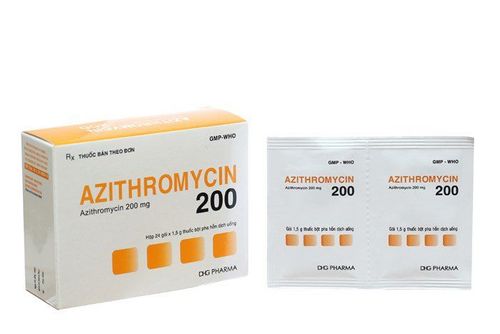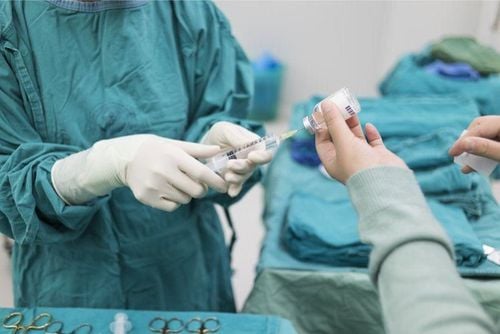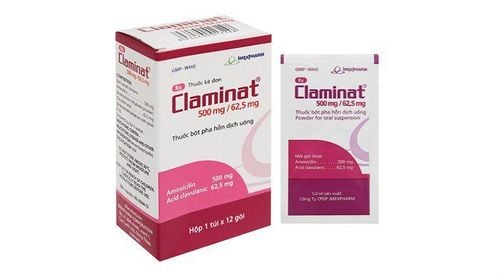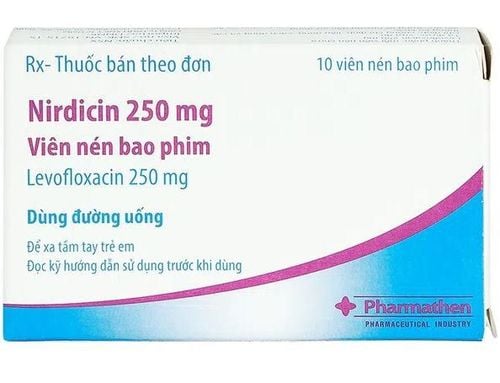This is an automatically translated article.
Rovahadin is an antibiotic indicated in cases of infections of the upper and lower respiratory tract, skin and genitals that are caused by sensitive bacteria... Let's learn about the uses and the notes when using it. Rovahadin drug through the article below.
1. What is Rovahadin?
Rovahadin drug is prepared in the form of film-coated tablets, containing the active ingredient Spiramycin 3,000,000 IU equivalent to Spiramycin 1g.
Active ingredient Spiramycin is an antibiotic belonging to the macrolide group of broad-spectrum antibacterial. Spiramycin has a bacteriostatic effect on bacteria that are dividing cells. At serum concentrations, the drug has a bacteriostatic effect, but when reaching concentrations in tissue cells, the drug has a bactericidal effect. The mechanism of action of Spiramycin is to act on the 50S subunit of the bacterial ribosome and inhibit protein synthesis. The spectrum of action of Spiramycin includes Gram-positive bacteria, Pneumococcus, Staphylococcus, Gonococcus, Streptococcus, Meningococcus, Enterococcus... However, this initial spectrum of activity has been reduced due to the widespread use of the antibiotic Erythromycin. Spiramycin has no effect on Gram-negative enteric bacteria.
Rovahadin is indicated in the following cases:
Upper respiratory tract infections: Acute sinusitis, ear infections, tonsillitis, pharyngitis; Lower respiratory tract infections: Exacerbation of chronic bronchitis, acute bronchitis, pneumonia; Skin and soft tissue infections; Genital infections.
2. Dosage of Rovahadin
Rovahadin is used orally, the dose of the drug is prescribed by the treating doctor based on the degree of infection and the patient's tolerance. Some recommendations on dosage of Rovahadin are as follows:
Adults: Take 1 tablet/time x 2-3 times/day; Infants and children: Take 150,000 – 300,000 UI/kg/day divided into 2-3 times; Prevention of meningococcal meningitis: Adults take 1 tablet/repeat dose every 12 hours for 5 days. Children receive a dose of 75,000 IU/kg/dose repeated every 12 hours for 5 days. Food reduces the absorption of Spiramycin, so patients need to take the drug 2 hours before meals or 3 hours after meals, the duration of drug treatment must follow the instructions of the treating doctor. Patients absolutely do not arbitrarily stop taking the drug when they feel their symptoms have improved because it will increase the risk of drug resistance.
3. Side effects of the drug Rovahadin
Rovahadin may cause some unwanted effects as follows:
Common: Indigestion, nausea, vomiting, diarrhea; Uncommon: Nosebleeds, fatigue, sweating, transient paresthesia, feeling of chest compression, dysesthesia, muscle and knee stiffness, myalgia, burning sensation, flushing, acute colitis , rash, skin rash, urticaria; Rare: Superinfection due to long-term drug use, anaphylactic reactions. Patients need to notify the treating doctor in case of experiencing unwanted effects when using Rovahadin.
4. Notes when using Rovahadin
Contraindicated to use Rovahadin in patients with hypersensitivity to Spiramycin, Macrolide antibiotics or any component of the drug.
Some notes when using Rovahadin:
Be careful when treating with Rovahadin in patients with liver dysfunction because the drug has the potential to cause liver toxicity; Pregnant women: Spiramycin crosses the placental barrier, but fetal blood concentrations are lower than those of the mother. The drug does not cause complications during treatment in pregnant women. However, the use of drugs in this subject should be prescribed and supervised by a doctor; Lactation: Spiramycin is excreted in breast milk in high concentrations, so it is recommended not to use Rovahadin while breastfeeding or to discontinue breast-feeding during treatment.
5. Drug interactions
Concomitant use of Rovahadin and oral contraceptives will reduce the ability to prevent conception. Therefore, patients in need of contraception should use another oral contraceptive when taking Rovahadin and oral contraceptives simultaneously.
Drug interactions occur that increase the risk of side effects and decrease the therapeutic effect of Rovahadin. Therefore, to ensure the safety and effectiveness of treatment, patients need to inform their doctors about the drugs and foods they are using before taking Rovahadin.
Please dial HOTLINE for more information or register for an appointment HERE. Download MyVinmec app to make appointments faster and to manage your bookings easily.













